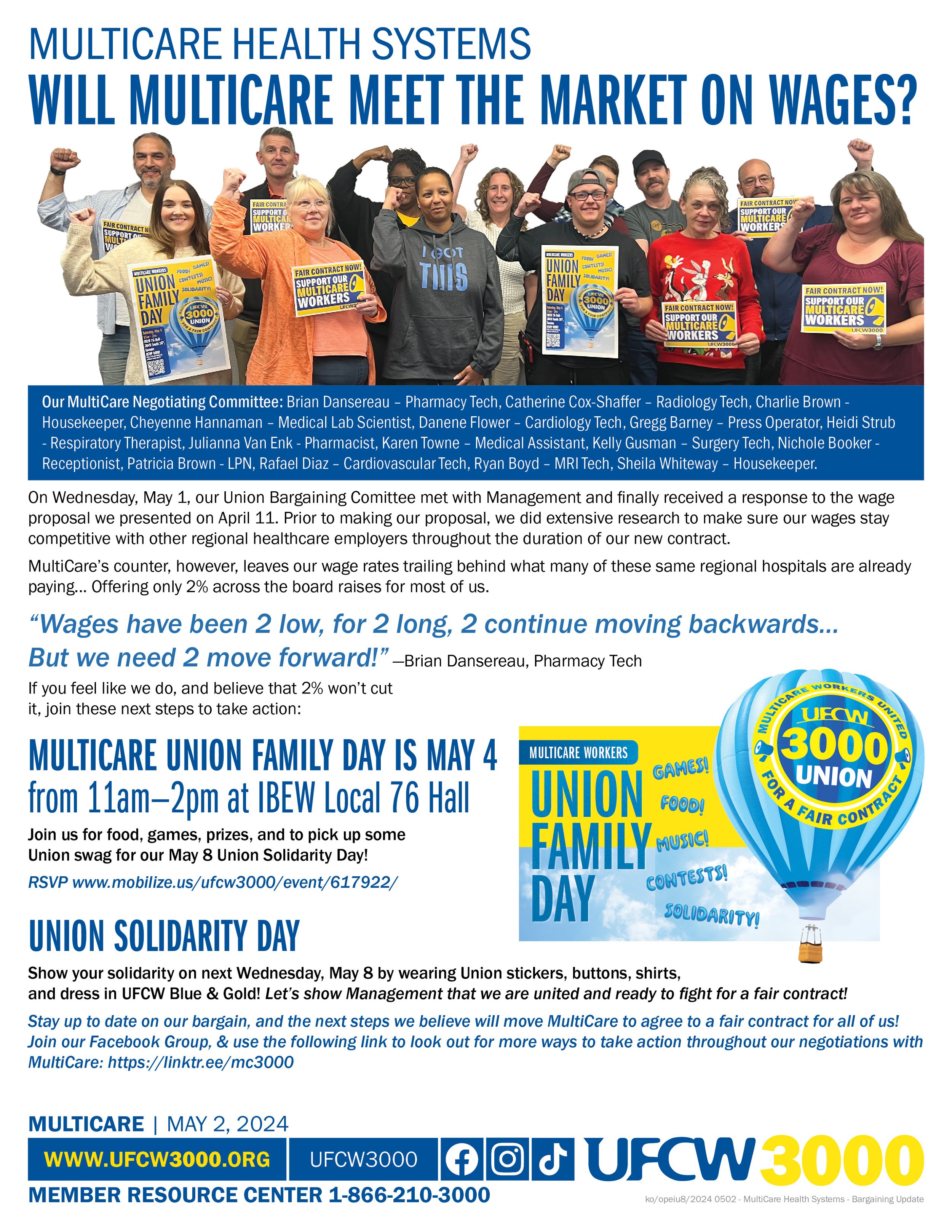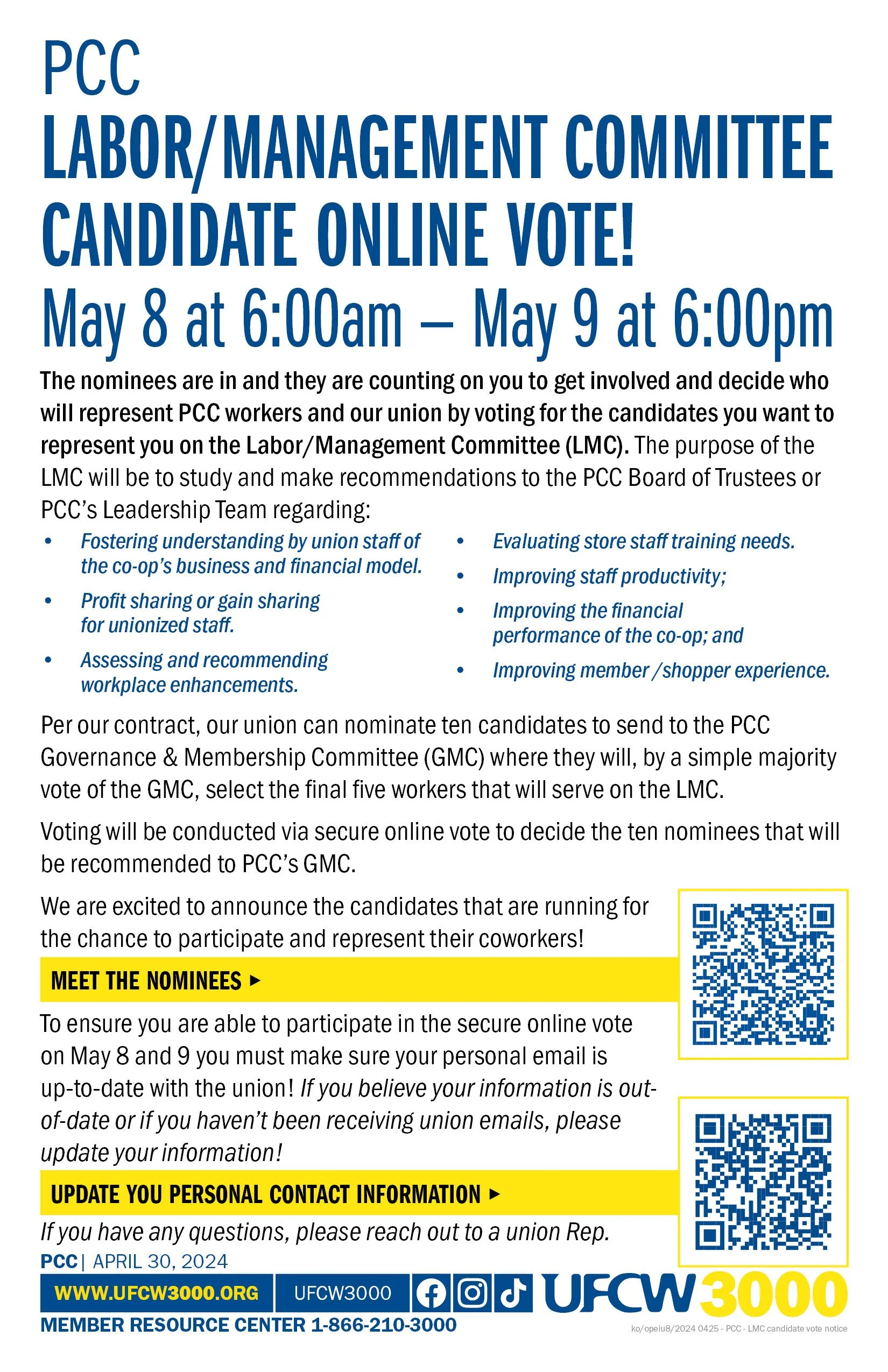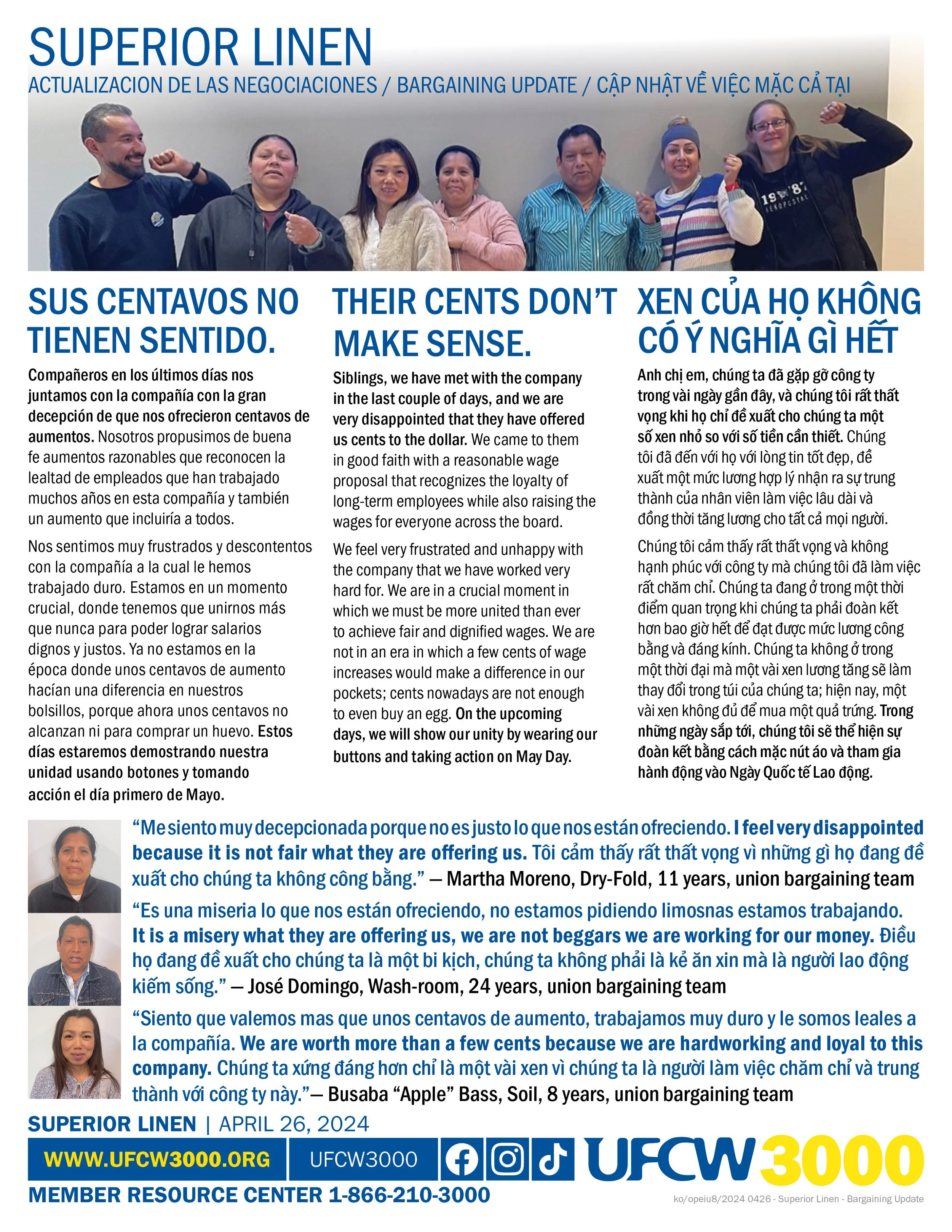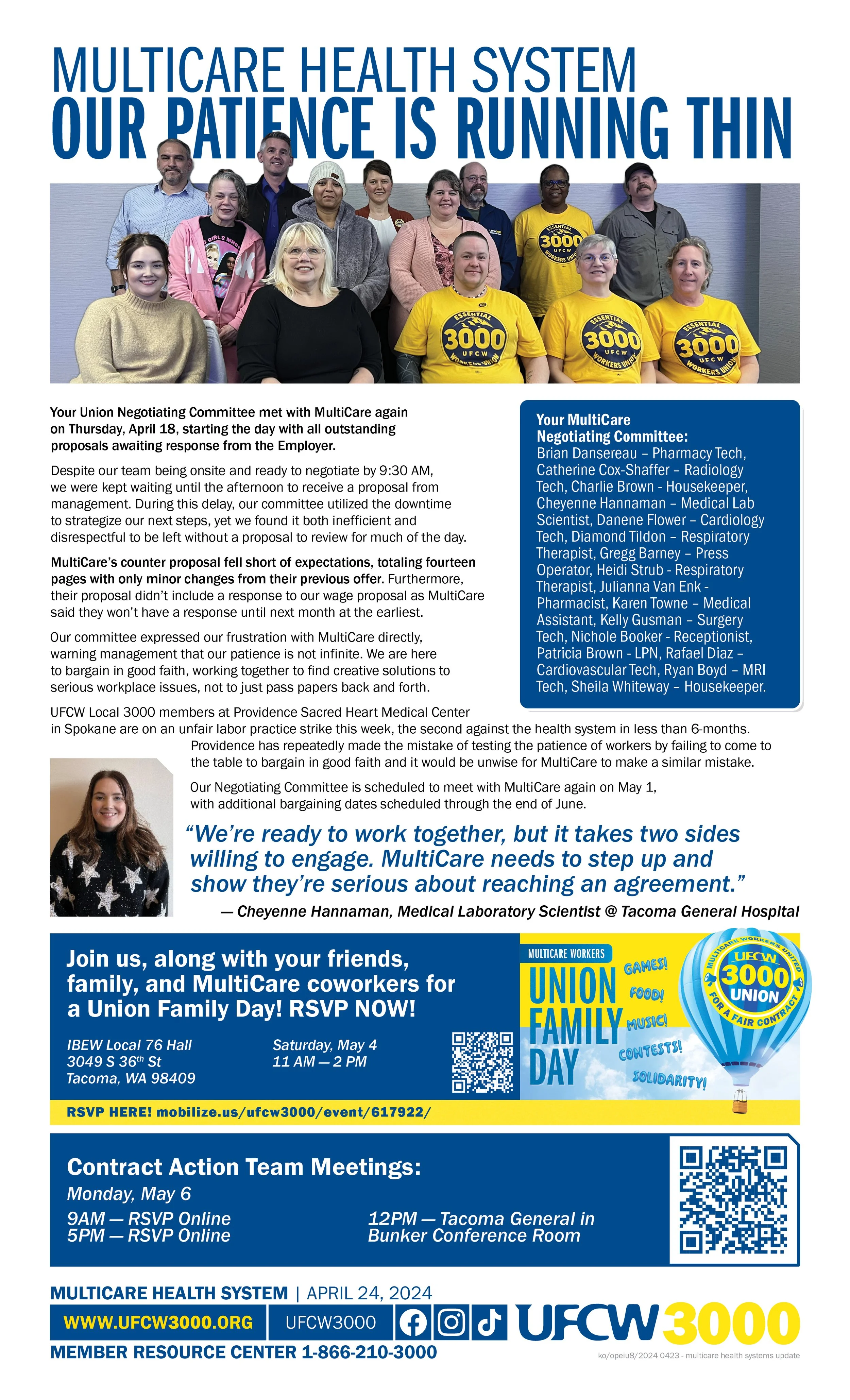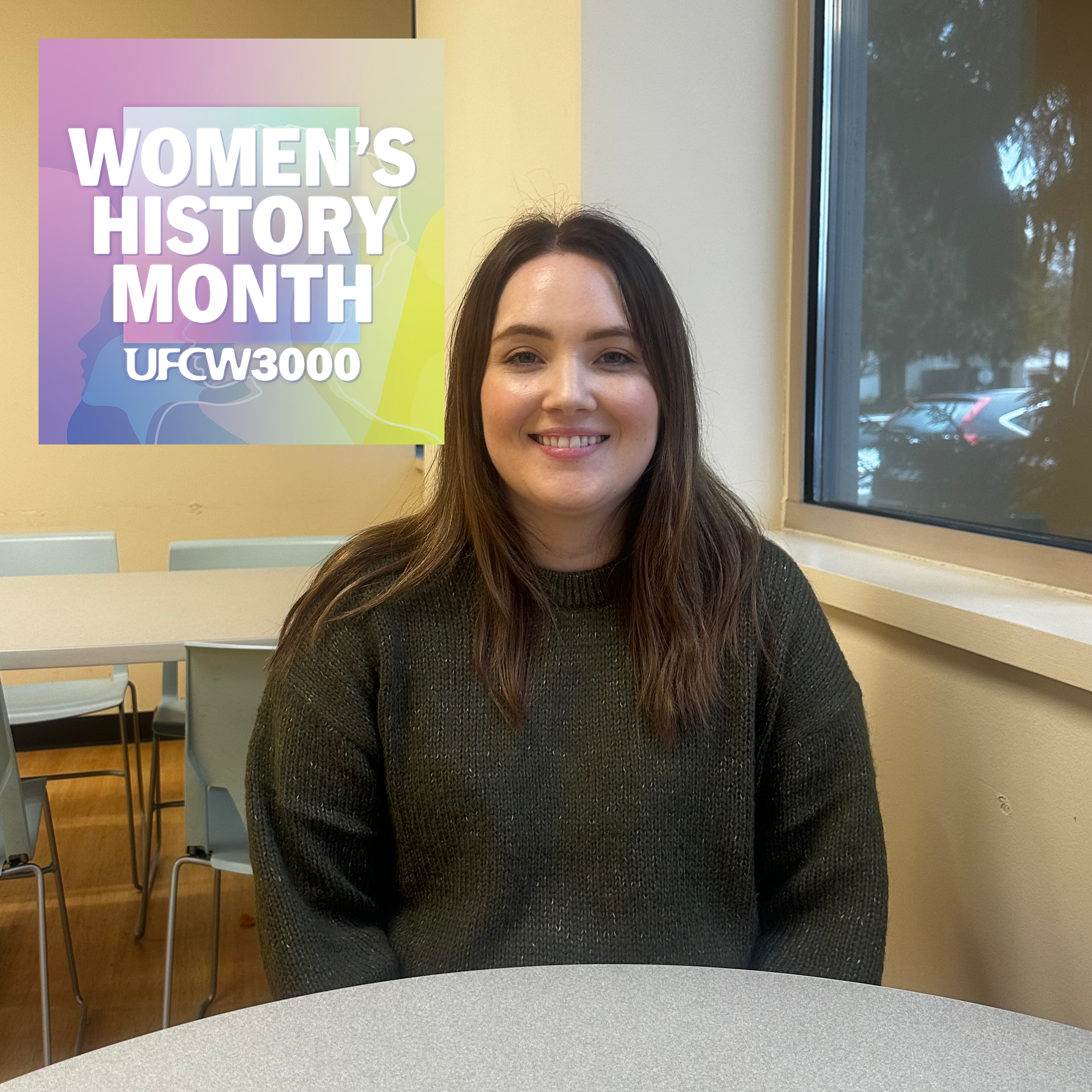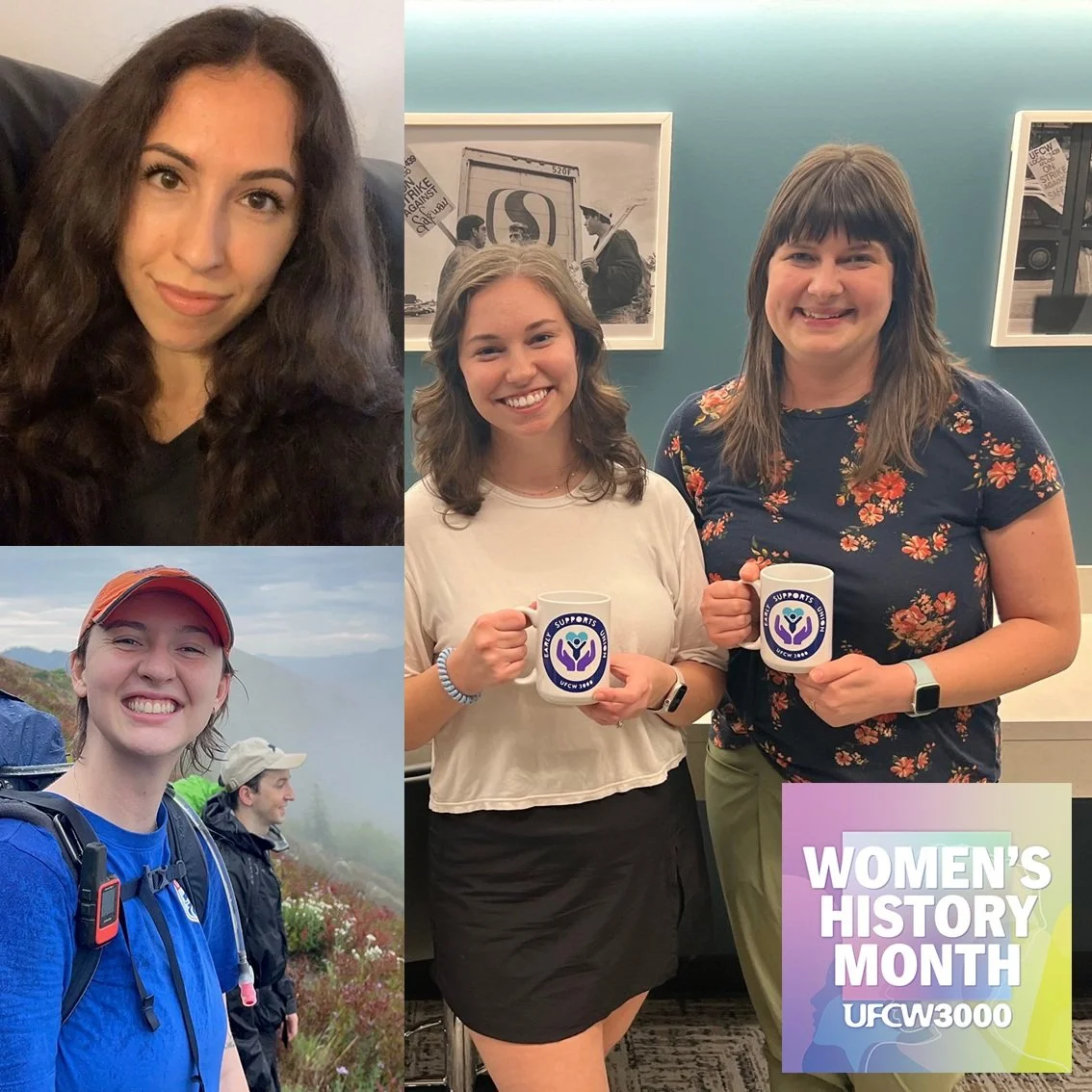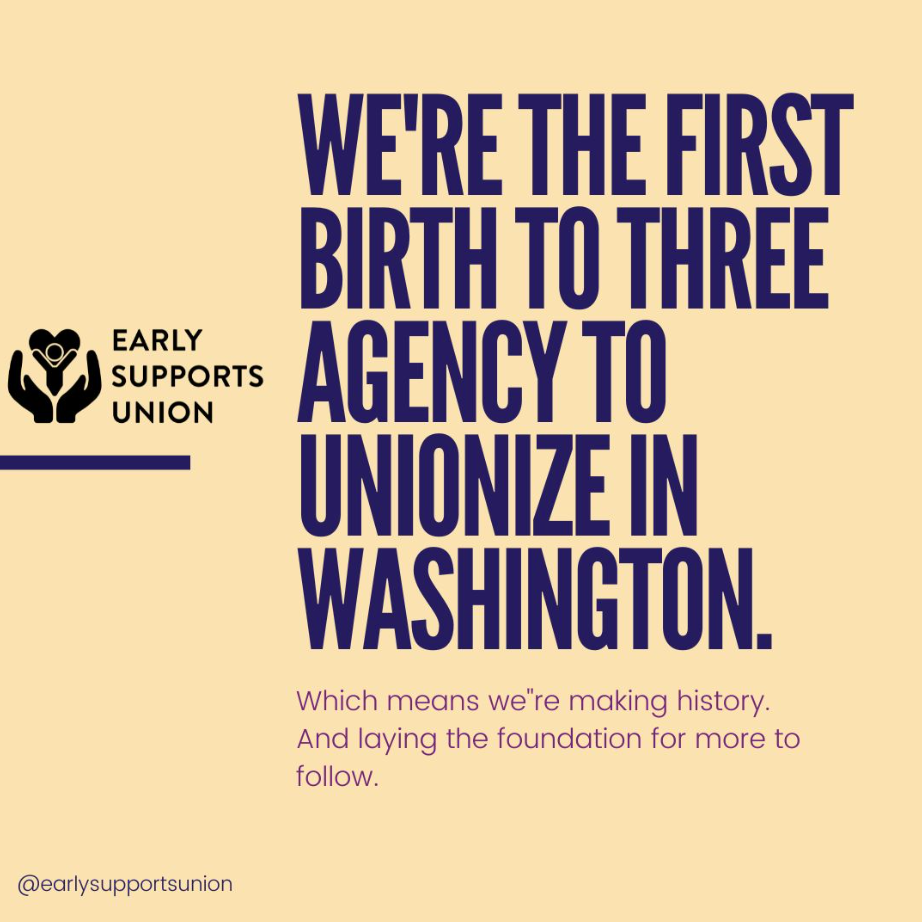Women's History Month Member Stories: Leaders from the 2013 Grocery Store Contract Campaign
/From Left to right Sue Wilmot, Rhonda Fisher-Ivie, Amy Dayley Angell, and Faye Guenther
As the 2013 contract negotiations between UFCW 21, UFCW 367, Teamsters 38, and the national grocery chains (represented by Allied Employers) in Western Washington opened, it was obvious that it was going to be a fight to win a fair contract. Workers were more united than ever and since 2004 they had been fighting to protect their contract, so concessions to the employers were out of the question.
Allied Employers, on the other hand (Albertsons, Kroger, and Safeway), were expecting to continue to cut their overhead at the expense of workers, and had prepared a long list of takeaways. As is often the case, women leaders in our Union stepped up big time to lead this contract fight, from the shop floors to coordinating the field campaign.
From the get-go things were tough, according to Bremerton Safeway worker Sue Wilmot: “The Employers’ first proposals had a picture of President Barack Obama signing the Affordable Care Act into law because they wanted to double the number of hours we needed to qualify for health care insurance. That would have been devasting to mothers working these jobs to provide benefits to their families.”
Sue had seen this before. In addition to serving on other bargaining teams, in 1989 she had walked the line during a grocery strike for over 90 days—often with her daughters, who were 3 and 5 years old at the time. Sue was not about to accept an insulting health care proposal like this. “I ripped up their proposals right in front of them. I know we didn’t want to show a reaction like that at the bargaining table, but I just couldn’t let that pass!”
In addition to cutting workers off their health care, the employers also wanted deep cuts to the pensions for Meat Department and Grocery workers, minimal raises, and were refusing to address important issues like keeping pay scales above the rising minimum wage, paid sick leave, and cashiers being terminated for mistakes in processing WIC transactions. Rhonda Fisher-Ivie, a cashier at Safeway in South King County at the time, had recently seen “two longtime coworkers with 15-20 years of service get terminated for WIC violations.”
These were a few of the many difficult issues that the bargaining team faced as they talked with employers unwilling to do much of anything to improve things. Faye Guenther had years of experience as an organizer with UFCW 1001 (one of the founding locals of the merged Local 21) and SEIU in Oregon. She knew that in order for the Union bargaining coalition to succeed in getting tough issues addressed, the rank-and-file was going to need to be ready—not just to threaten a strike, but be ready to actually strike. Organizing a powerful field campaign, workers started out by wearing union buttons and leafletting customers in front of their stores. “From there, we moved to escalations like a flash mob for paid sick leave” at the University Village QFC, says Faye. After that came coordinated July info pickets at locations across Western Washington, followed by “rolling info pickets at multiple stores throughout the day” in late summer.
Amy Dayley Angell was a cashier at the Wallingford QFC in Seattle and had recently stepped up to become a union leader at her store when a grocery clerk was terminated for misreading an ID during a tobacco sale. She started a petition that a supermajority of workers at the store signed and eventually convinced QFC to bring back their coworker. As the contract campaign heated up, Amy kept her coworkers informed and recruited them for the actions throughout the summer including the info picket at their store.
In September, the Union bargaining team called for strike votes. Keeping coworkers educated about the stakes of the negotiations and reminding them of the need to act in solidarity was key as the strike votes approached. The campaign had started in March of 2013 and it looked like it would go well into October. Keeping everyone engaged and organized was something that rank-and-file leaders and staff organizers worked on from the beginning, and it started to pay off.
“People got behind it right away,” says Rhonda. “They were ready to act!” The strike authorization passed with over 90% of members voting to strike if called for. The membership of the three unions were elated, but knew that now things were getting serious. Preparing for a strike was the next thing leaders had to do.
Amy and other shop stewards started to attend picket captain trainings, where they learned how to draft picket schedules for their stores, explain to coworkers what is expected on a strike line, and how they could get strike relief pay. More and more grocery store workers were stepping up to become picket captains and leaders in the store. Solidarity and resolve were edging out fear and anxiety.
“It was a bonding experience,” says Sue. “We were organizing babysitting networks so parents could walk the line, and made maps of where people could shop and get prescriptions filled during a strike and not cross the picket line.”
“As the campaign escalated with strike votes and picket captain meetings, the number of activists kept getting bigger and bigger,” explains Amy. “And then in October, the Union bargaining coalition delivered a 72-hour strike notice to the Employers, and everything changed quickly!”
Faye says that at this point the campaign started to become “transformative not just for grocery workers, but for our union as a whole.” UFCW 21, Teamsters 38, and UFCW 367 set up a giant countdown clock at Westlake Park in Downtown Seattle. Nightly rallies were held, which quickly made the countdown clock THE place for grocery workers to be. Customers pledged to not cross the picket line at their local grocery store and they let store managers know it. The workers had broad support from across the community.
Emily and Lacey Wilmot (Sue Wilmot’s daughters) at the Countdown Clock in WestLake Park
Grocery workers and their families came from all over region to the clock. Sue’s daughters, who had walked the picket line with their mom during the 1989 strike, made a special trip from Bremerton to join in the fun and brought donations of diapers and food for striking families.
“Being at the clock was inspiring!” relates Amy. “My coworkers and I went as often as we could. It was the first time we felt our collective power as grocery workers!”
Rhonda confirms this as well: “Everyone shared the same passion, had the same goal… We were ready for a strike!”
At the bargaining table, the Employers quickly began to move, agreeing to reform their WIC transaction policy, keeping the health care as-is, making further moves to secure the the pensions, and putting more money into wages.
Besides getting the last few takeaways off the table, “it came down to better transfer language between departments, or making sure that our pay scales stayed above minimum wage,” Sue explains. The contract already guaranteed that the starting wage had to be above minimum wage, but the Union bargaining coalition wanted to make sure each step had a higher wage than they one below it. Sue says it was a tough decision, “but we went for the progressive wage scale.” This turned out to be an important decision, and today above-minimum-wage progressive wage scales have become the standard for many union workplaces represented by UFCW 3000.
The strike was averted just two hours before it was to begin. In early November of 2013, grocery store workers at all three unions ratified the new contract!
Faye was right to say that the 2013 grocery store campaign was “transformative.” So many new leaders stepped up, and many of them were women. That leadership continues today, not just with grocery workers, but in all the industries where our UFCW 3000 members work.
Rhonda Fisher-Ivie relocated to Southern California and was hired as a union rep by UFCW 770, and eventually returned to Washington State and works at UFCW 3000 representing her former coworkers.
Amy Dayley Angell continued grow as a shop steward and eventually began serving on the UFCW 3000 Executive Board, and has been on two grocery store bargaining committees. “After 2013, I knew I needed to be in this fight, and so I threw myself into the center.” She is currently keeping her coworkers informed about the UFCW 3000 grocery store negotiations in Eastern Washington, Idaho, and Northern Oregon, and preparing them for the 2025 grocery negotiations in Puget Sound.
Sue Wilmot continued to serve on the Executive Board until 2020 when she was hired at UFCW 3000 to work in the Member Resource Center talking to members and investigating their potential grievances. She retired in 2023 and is now spending time babysitting her grandchildren for her daughters, one of whom works as a barista at a Safeway Starbucks kiosk (which is a union position of course).
Faye Guenther continued to lead field campaigns at the Union and has worked with staff and members to expand the number of shop stewards in worksites. She served as Staff Director, Secretary Treasurer, and now serves as the elected President of UFCW 3000.
Women’s history is labor history! And it is ongoing. New leaders, many of them women, are stepping forward in all industries of our union and the labor movement as a whole. In 2022, UFCW 21 and UFCW 1439 came together to form UFCW 3000, the largest UFCW local in the country and the largest union local in Washington State. The grocery and meat members East of the Cascades are bargaining their contracts and just finished a round of info pickets, building solidarity and keeping each other engaged and organized. And women leaders are at the front of that fight, too.





